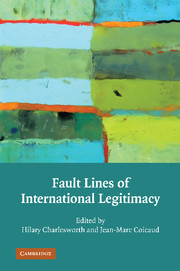Book contents
- Frontmatter
- Contents
- Acknowledgments
- Contributors
- Introduction
- PART I FROM THE HISTORY AND STRUCTURE OF INTERNATIONAL LEGITIMACY TO FAULT LINES IN CONTEMPORARY INTERNATIONAL POLITICS
- PART II THE UN SECURITY COUNCIL: EXPRESSION, VENUE, AND PROMOTER OF INTERNATIONAL LEGITIMACY?
- PART III LEGITIMACY OF INTERNATIONAL INTERVENTIONS AND HIERARCHY OF INTERNATIONAL RIGHTS
- PART IV IN SEARCH OF NEW FORMS OF INTERNATIONAL LEGITIMACY: BETWEEN POWER AND PRINCIPLES
- 11 Determining How the Legitimacy of Intervention Is Discussed: A Case Study of International Territorial Administration
- 12 The Legitimacy of Economic Sanctions: An Analysis of Humanitarian Exemptions of Sanctions Regimes and the Right to Minimum Sustenance
- Conclusion: The Legitimacies of International Law
- Index
- References
12 - The Legitimacy of Economic Sanctions: An Analysis of Humanitarian Exemptions of Sanctions Regimes and the Right to Minimum Sustenance
Published online by Cambridge University Press: 06 April 2010
- Frontmatter
- Contents
- Acknowledgments
- Contributors
- Introduction
- PART I FROM THE HISTORY AND STRUCTURE OF INTERNATIONAL LEGITIMACY TO FAULT LINES IN CONTEMPORARY INTERNATIONAL POLITICS
- PART II THE UN SECURITY COUNCIL: EXPRESSION, VENUE, AND PROMOTER OF INTERNATIONAL LEGITIMACY?
- PART III LEGITIMACY OF INTERNATIONAL INTERVENTIONS AND HIERARCHY OF INTERNATIONAL RIGHTS
- PART IV IN SEARCH OF NEW FORMS OF INTERNATIONAL LEGITIMACY: BETWEEN POWER AND PRINCIPLES
- 11 Determining How the Legitimacy of Intervention Is Discussed: A Case Study of International Territorial Administration
- 12 The Legitimacy of Economic Sanctions: An Analysis of Humanitarian Exemptions of Sanctions Regimes and the Right to Minimum Sustenance
- Conclusion: The Legitimacies of International Law
- Index
- References
Summary
Thomas Franck pointed out that legitimacy is the generic label we have placed on factors that affect our willingness to comply voluntarily with commands, and legitimacy is the standard by which the community measures a rule's capacity to obligate.
With regard to the issue of the legitimacy of economic sanctions, there were long-standing discussions concerning the sanctions implemented against Iraq from 1990 to 2003. Reports by United Nations (UN) humanitarian agencies indicated that UN economic sanctions against Iraq had a negative impact on humanitarian conditions in that country despite the program of humanitarian exemptions.
It has become customary to include certain exemptions in sanctions regimes. The most common exemptions are supplies intended for medical purposes; other common exemptions include food, educational equipment, publications, and news materials. If the imposition of economic sanctions proved to be legal but the program of humanitarian exemptions relative to the economic sanctions was not working well, the Security Council was responsible for improving the program for the legitimacy of the sanctions regime, especially in light of evolving norms of human security. In this context, MacFarlane and Khong pointed out that the Security Council and other bodies within and around the UN moved both to make the protection of civilians and humanitarian assistance a potential reason for Chapter VII action against a state that was not fulfilling its responsibilities and to adjust the UN's own actions in order to consider their implications for civilians in target states.
- Type
- Chapter
- Information
- Fault Lines of International Legitimacy , pp. 360 - 388Publisher: Cambridge University PressPrint publication year: 2010



